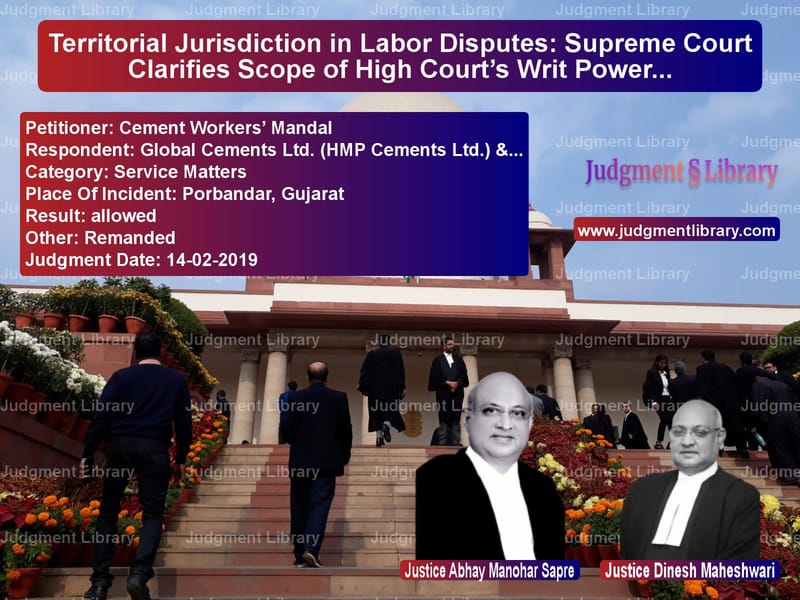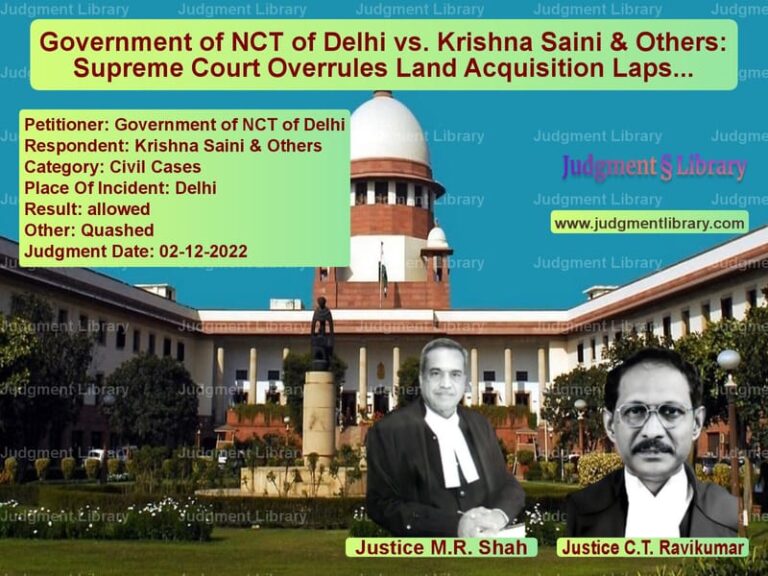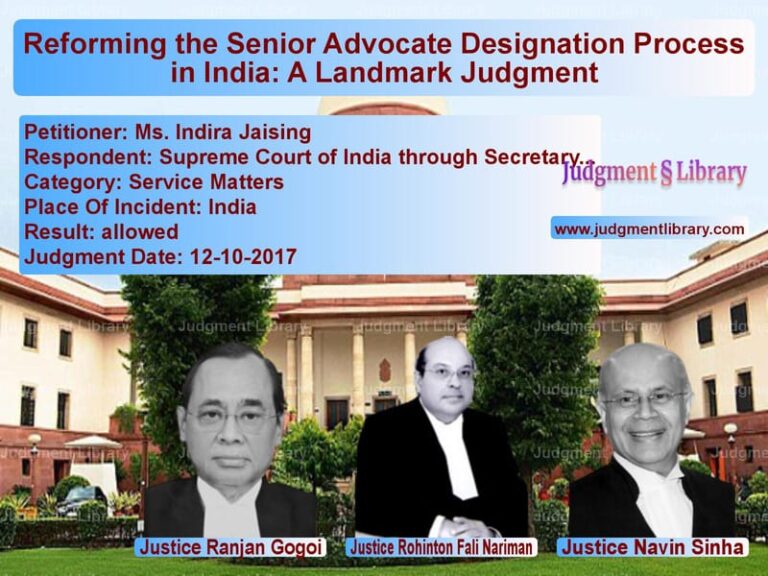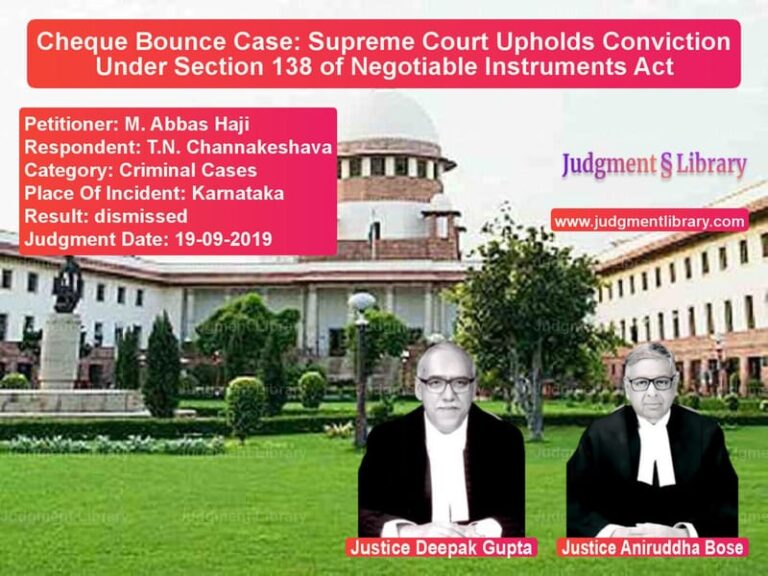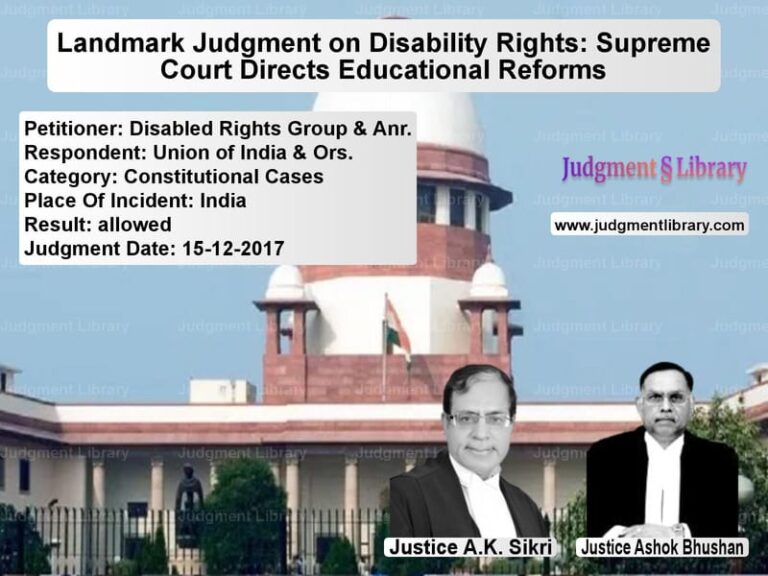Territorial Jurisdiction in Labor Disputes: Supreme Court Clarifies Scope of High Court’s Writ Powers
The case of Cement Workers’ Mandal vs. Global Cements Ltd. & Ors. revolves around a crucial question regarding the territorial jurisdiction of the High Court in labor disputes. The Supreme Court was tasked with deciding whether the Gujarat High Court had the authority to entertain a writ petition concerning unpaid wages when the respondent company’s registered office and debt recovery proceedings were based in Kolkata.
Background of the Case
The dispute arose when Global Cements Ltd. (formerly HMP Cements Ltd.), which operated a cement factory in Porbandar, Gujarat, closed down operations in 1998 without paying outstanding wages to its workers. The Cement Workers’ Mandal, a registered union representing approximately 500 workers, initiated legal proceedings to recover unpaid wages.
The union filed a recovery application before the Labor Court in Junagadh under the Industrial Disputes Act, 1947. The Labor Court ruled in favor of the workers and issued a recovery certificate directing Global Cements Ltd. to pay Rs. 81,50,744 with an additional cost of Rs. 50,000. However, the recovery certificate remained unexecuted.
Meanwhile, the Indian Bank, which had provided business loans to Global Cements Ltd., initiated proceedings before the Debt Recovery Tribunal (DRT) in Kolkata for recovery of unpaid loans. The DRT ordered the sale of the company’s assets, appointing a receiver to oversee the process. The workers, fearing that their dues would be ignored, approached the Gujarat High Court through a Special Civil Application (SCA), requesting that 50% of the sale proceeds be allocated for pending wages.
Legal Dispute and High Court Proceedings
Global Cements Ltd. and Indian Bank challenged the maintainability of the SCA, arguing that the Gujarat High Court lacked territorial jurisdiction since:
- The company’s registered office was in Kolkata.
- The DRT proceedings were taking place in Kolkata.
- All financial transactions related to the loans occurred outside Gujarat.
The Single Judge of the Gujarat High Court ruled in favor of the workers, holding that the petition was maintainable since the cause of action partially arose in Gujarat where the workers had been employed and where the Labor Court had issued the recovery certificate.
However, the Division Bench of the Gujarat High Court overturned the decision, holding that the writ petition should have been filed in the Calcutta High Court as the primary proceedings were taking place in Kolkata.
Petitioner’s Arguments
The Cement Workers’ Mandal, representing the affected workers, argued:
- The Gujarat High Court had jurisdiction since the workers were employed in Gujarat, and their unpaid wages constituted a cause of action within the state.
- The recovery certificate issued by the Labor Court in Junagadh was binding and should be enforced within Gujarat.
- The financial distress of the company did not absolve it of its legal obligation to pay wages.
- The workers had a right to approach the High Court under Article 226 of the Constitution of India.
Respondent’s Arguments
Global Cements Ltd. and Indian Bank contended:
- The case should be heard in Kolkata since the company’s financial dealings, including the DRT proceedings, were based there.
- The Gujarat High Court lacked jurisdiction to interfere in a matter where the primary dispute was being adjudicated by the DRT in Kolkata.
- Allowing the Gujarat High Court to hear the case would create jurisdictional conflicts.
Supreme Court’s Observations
The Supreme Court carefully analyzed the legal provisions governing territorial jurisdiction under Article 226(2) of the Constitution, which states:
“The power conferred by clause (1) to issue directions, orders, or writs to any Government, authority, or person may also be exercised by any High Court exercising jurisdiction in relation to the territories within which the cause of action, wholly or in part, arises.”
The Court also referred to Section 20 of the Civil Procedure Code (CPC), which states that a suit should be filed where the defendant resides or where the cause of action arises.
Key Judicial Findings
The Supreme Court ruled that the Gujarat High Court had jurisdiction because:
- The cause of action partially arose in Gujarat since the affected workers were employed there.
- The Labor Court at Junagadh had issued a recovery order within Gujarat.
- The impact of non-payment of wages directly affected workers residing in Gujarat.
The judgment emphasized:
“The expression ‘cause of action, wholly or in part, arises’ under Article 226(2) must be read in conjunction with Section 20 of the CPC. The fact that the workers were employed in Gujarat and had secured a recovery order there is sufficient to confer jurisdiction upon the Gujarat High Court.”
Final Judgment
The Supreme Court ruled:
- The Division Bench of the Gujarat High Court erred in dismissing the petition on jurisdictional grounds.
- The Single Judge’s order was restored, confirming that the Gujarat High Court had territorial jurisdiction.
- The case was remanded to the Gujarat High Court for a decision on merits.
- The court urged the Gujarat High Court to expedite proceedings due to the long pendency of workers’ claims.
Conclusion
This landmark judgment reaffirms the principle that workers’ rights should not be undermined by technical jurisdictional objections. By upholding the Gujarat High Court’s jurisdiction, the Supreme Court has ensured that legal redress remains accessible to employees affected by corporate closures. The ruling sets a precedent for similar labor disputes where companies attempt to evade legal responsibility by shifting proceedings to different states.
Petitioner Name: Cement Workers’ Mandal.Respondent Name: Global Cements Ltd. (HMP Cements Ltd.) & Ors..Judgment By: Justice Abhay Manohar Sapre, Justice Dinesh Maheshwari.Place Of Incident: Porbandar, Gujarat.Judgment Date: 14-02-2019.
Don’t miss out on the full details! Download the complete judgment in PDF format below and gain valuable insights instantly!
Download Judgment: Cement Workers’ Mand vs Global Cements Ltd. Supreme Court of India Judgment Dated 14-02-2019.pdf
Direct Downlaod Judgment: Direct downlaod this Judgment
See all petitions in Employment Disputes
See all petitions in Public Sector Employees
See all petitions in Judgment by Abhay Manohar Sapre
See all petitions in Judgment by Dinesh Maheshwari
See all petitions in allowed
See all petitions in Remanded
See all petitions in supreme court of India judgments February 2019
See all petitions in 2019 judgments
See all posts in Service Matters Category
See all allowed petitions in Service Matters Category
See all Dismissed petitions in Service Matters Category
See all partially allowed petitions in Service Matters Category

